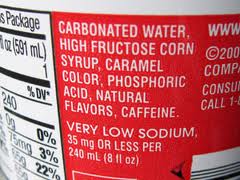“Do you have the opportunity to do what you do best every day?” asks Tom Rath, author of the book Strengths Finder 2.0. ”Chances are, you don’t,” he continues. “All too often, our natural talents go untapped. From the cradle to the cubicle, we devote more time to fixing our shortcomings than to developing our strengths.”
As a result, Rath writes, 77 percent of parents “think that a student’s lowest grade deserves the most time and attention.” And “teachers reward excellence with apathy instead of investing more time in the areas where a child has the most potential for greatness.”
It makes sense. We’d all be a lot better off by knowing what we do best and then just doing it, says Rath. By focusing on our weaknesses, we take the path of most resistance and life’s a lot harder than it has to be.
I was reminded of this recently when I learned that my neighborhood co-op, Harvest Moon, was going to start selling Coke products.
Not just Coke. Country Hearth bread. Jif peanut butter. Progresso soups. Creamette pastas. Bongard’s cheese. Products that couldn't pass the quality standards -- no artificial ingredients, no GMOs, no HFCS, no growth hormones, etc. -- of other Twin Cities co-ops like Lakewinds, Linden Hills, or Valley Natural Foods, to name just three. Not to mention Whole Foods.
 Sure, I knew that Harvest Moon was having a tough first year in business. Opening a retail operation in this economy would be an uphill battle for anyone, but changing the buying habits of a community as affluent and far-flung as Orono has been a particularly vexing challenge.
Sure, I knew that Harvest Moon was having a tough first year in business. Opening a retail operation in this economy would be an uphill battle for anyone, but changing the buying habits of a community as affluent and far-flung as Orono has been a particularly vexing challenge.
But I was shocked when I got the Harvest Moon member e-mail that began with “Say Hello Cheerios. Welcome, Coke!” What? Surely, Harvest Moon’s board of directors could not possibly believe that selling Cheerios, Coke and similar products would make a positive change, could they? Couldn’t they see that this decision might only confuse the market, muddle their message, and devalue their brand? And that none of those, in the long run, would improve sales?
Let’s just say that I was presented with a good opportunity to practice accepting a perceived shortcoming, and focusing, instead, on Harvest Moon’s strengths, starting with...
Strength #1: A new, smart, youthful, capable, enthusiastic general manager, who’s making a home and raising a young family in the community where he works.
“I know that there are going to be members concerned about these products,” said David Giedd, Harvest Moon’s new leader, when I talked to him by phone. “But we can’t ignore the capitalistic concepts at place. Offering these conventional products is just a small change we have to make to get more people in the door."
Giedd is open and pragmatic about the turn-around challenge he faces. He told me when Harvest Moon opened, weekly sales were projected to be about $70 thousand. In the past three months, the average has been in the $40 thousand range. The store needs about $55 thousand in sales per week just to break even, which includes servicing their start-up debt.
His hope is to use the conventional products to get so-far reluctant shoppers to try the store, then to convince them, over time, to “trade up” with some properly executed educational tools. “If Cheerios are displayed next to the organic equivalent, maybe we can get people to try some products they’ve never tried before,” Giedd said. “Plus we’re going to create in-store signage that will make it very clear which products are the natural/organic ones.” He added that only the natural/organic products will be the ones featured in sales and special promotions.
Strength #2: Even with the addition of Coke et al to its inventory, 99 percent of the products Harvest Moon will sell are still the type that I want to support with my food dollars.
 “Just to give you some perspective,” said Giedd, “on an average day, we have over $150 thousand worth of inventory in the store. Only about $2 thousand of that will be in conventional products. That’s just slightly over one percent. For comparison sake, the co-op in Eau Claire, Wisconsin, which, by the way, does $11 million in business per year, dedicates 10 percent of its inventory to conventional products.”
“Just to give you some perspective,” said Giedd, “on an average day, we have over $150 thousand worth of inventory in the store. Only about $2 thousand of that will be in conventional products. That’s just slightly over one percent. For comparison sake, the co-op in Eau Claire, Wisconsin, which, by the way, does $11 million in business per year, dedicates 10 percent of its inventory to conventional products.”
Giedd added: “If the products that you want to support are natural, organic products, we’ve got them. So, please come in and buy them!”
Strength #3: Harvest Moon learns from its mistakes and fixes them.
Giedd told me about more changes coming or already in place at Harvest Moon, including better inventory management of perishable foods, especially meat, dairy and produce, which has been, in his opinion, the area most in need of improvement.
“We’re doing weekly rather than monthly inventory audits in these areas of the store,” explained Giedd, “so we can respond more quickly to supply and demand.”
He also admitted that they need to do a better job with pricing: “Here’s an example. Applegate chicken/apple sausage were, for some reason, priced at $6.29 per package. But we would have made a reasonable profit selling it for $4.99.” Giedd said that once they changed the price, the sausage sold out in two days.
Most important, Giedd explained, is the feeling that shoppers should have walking into the store. “I want people to feel excited, happier, and better just by driving into our neighborhood. I want them to feel the energy, the passion and the customer service that we bring to their shopping experience. When you go to a community-owned co-op, you want to get the sense that the people working there are happy to see you. That the people working there are happy to be there. And that takes leadership. It starts with me.”
Strength #4: Harvest Moon, like other Twin Cities co-ops, is guided by the wants and needs of the community it serves.
When I asked representatives from other co-ops in the area what they thought about Harvest Moon's decision to carry more conventional products, they were unanimously supportive. Sean Doyle, general manager of Seward co-op in Minneapolis, wrote in an e-mail to me:
While we all strive for the highest quality products possible, we also at times need to make compromises based on consumer needs. For example at Seward Co-op we carry Cheerios and commodity cheeses as well as few other conventional products because we desire to serve low income shoppers. We accept WIC (Women Infants and Children) vouchers which requires us to carry these products. We do so gladly because the co-op needs to serve as many communities as possible.
Lindy Bannister of Minneapolis’s Wedge co-op let me know that she too was sympathetic with Harvest Moon's need to compromise. She wrote:
Every co-op has an obligation to its members to carry the products that they want to buy in the store.
And Allie Mentzer of Linden Hills co-op had this to say:
Nationwide, the products on co-op shelves vary quite a bit, depending on the surrounding community's needs -- and sometimes that includes conventional, convenience products. Remaining responsive to member-owner needs is a key piece to being a successful co-op.
Of course, they’re right. And I’m grateful to them all for helping me see this issue with different eyes. Although my first response to Harvest Moon’s decision to carry Coke and other conventional products was dismay and disappointment, I now realize that I’d rather have a co-op in my community that carries a tiny selection of conventional products than have no co-op at all. So, if the decision to carry Coke and Cheerios and Progresso soup is what it takes to save Harvest Moon and the rest of its organic, natural, humanely-produced product offerings, then I'm all in favor.
By heeding the advice of Strengths Finder 2.0 and focusing on the strengths of my co-op -- of all co-ops -- I can help them continue to do what they do best every day.

Shari Manolas Danielson is a frequent contributor to Simple, Good and Tasty. Her last post was Does Chocolate Milk Belong in Our Schools? She's also a yoga instructor who lives a life of blissful tranquility with a husband that works too much, twin 9-year-old daughters that sass too much, three dogs that shed too much, and a house in the Minneapolis suburbs that costs too much. Her new blog -- shutupmama.com -- will launch in April 2011.




